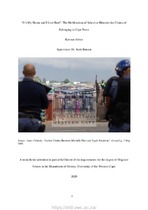| dc.description.abstract | This mini thesis seeks to explore two legacies of apartheid: the insecurity of decent and available housing that has led to a housing crisis, and the insecurity of Coloured identity as caused by apartheid’s racial and identity politics and its aftermath in a democratic South Africa. Furthermore, it is an examination of identity and its relation to place, specifically Coloured identity in the place of Cape Town. It focuses the ripple effect of belonging, as this research starts with Cape Town then expands to further find cause for this growing cause of belonging by focusing on racism, the housing crisis, nation-building, globalisation, capitalism. Through interviews and archival research, I explore questions of belonging, identity, and its relation to the housing crisis in Cape Town. This is done through a case study of tensions that erupted in Siqalo, in Mitchell’s Plain on 1 May 2018. Siqalo is a land occupation of isiXhosa speakers in the apartheid-era ‘Coloured’ area of Mitchell’s Plain in Cape Town. When Siqalo residents organised a protest around issues of electricity and housing they faced violent retaliation by neighbouring community and residents of Colorado, populated mainly by people classified as Coloured, with claims being made by an organisation called Gatvol Capetonians for Siqalo residents to return to Eastern Cape. I examine the role of identity in the creation of narratives of Cape Town and establish two narratives, one in which Cape Town is represented as a home for all and one in which it is not, this is done to show how belonging is made through identity and narrative and the effect that this creates. This comes to frame this mini-thesis as the question of a home is represented in the symbolic and physical sense and highlights the tension between Gatvol’s protest of Coloured belonging and Siqalo residents’ protest for decent housing. Chapter Two reflects on this through the use of interviews from both sides of the protest. This chapter is written as an imagined debate that not only reflects on critiques of oral history but ways of writing history experimentally or speculatively Through investigating the source of the tension from the Siqalo protest, I argue that desegregation was, in theory, one of the first nation-building projects in South Africa, and its failure has deepened apartheid and colonial forms of classification that divide people. The views of Mahmood Mamdani, while rarely applied to African people classified as Coloured, are very important, as his book, Citizen and Subject was a premise for this research as it highlighted the pitfalls and requirements of African countries after independence from colonialism. At the same time, the literature on Coloured identity rarely brings up the question whether Coloureds can and do practice racism on those classified as black or African and how these categorisations have persisted in the post-apartheid era. This research asks: to what extent do present conditions enable a predatory dynamic to claims of Coloured identity? Based off the predatory argument which focuses on intensified competition for scarce resources under globalisation put forward by Arjun Appadurai, I highlight the influence that contemporary globalisation has had on both the dynamics of Coloured identity and on the housing crisis in Cape Town. This mini thesis concludes by providing two alternatives as to how the question of race can be assessed in South Africa. | en_US |

